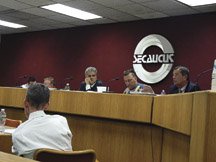Members of the Town Council held an often tense and combative meeting on Tuesday with representatives of the auditing firm that has done municipal audits for Secaucus for at least the past 15 years.
For two hours, the governing body grilled auditors from Suplee, Clooney & Company regarding the details of the 2009 audit, which the company submitted in October. Of particular importance to the council was why the auditors failed to detect, over a period of several years, more than $8 million in grants, fines, unpaid fees, and other money that was owed to the town but never collected.
Town Chief Financial Officer Margaret Barkala also attended the meeting, since many of the records reviewed during the annual audit came from her office.
Acknowledging that he is new to municipal audits, Town Councilman Robert Costantino, chair of the council’s Finance Committee, asked Warren Korecky, a partner with Suplee, Clooney, to explain in layman’s terms how the firm does a town audit.
“I respond to what I find out. If something isn’t posted or billed out, how would I know about it?” – Warren Korecky
________
“Briefly, you’re coming in, just to assess what’s here,” Korecky replied. “Statutorily you know what records have to be maintained. Based on that when you review in the internal controls, you get an understanding of what’s here and assess what risk you have. Based on what you think your risks are, that will determine the scope of your audit once you start looking at the numbers.”
The meeting, which the council called an “exit conference” with Suplee, Clooney, started out cordially enough. But it was all downhill from there.
Mayor Michael Gonnelli briefly outlined some of the money that had gone uncollected and unnoticed by Suplee, Clooney over the past few years: $750,000 in uncollected false alarm fines owed to the town by several Secaucus-based businesses; $2.3 million in state and federal grants that were approved but never paid out because the town failed to submit the necessary paperwork to get the money; and $4.8 million in special assessments owed for roadwork and other improvements made to streets that are primarily accessed by a handful of businesses.
The $8 million figure doesn’t include another $3 million owed in uncollected taxes and foreclosed properties in town that are not generating tax revenue, nor does it include the $777,725 allegedly stolen from the Tax Collector’s Office over a number of years.
“We had almost $6 million in special assessments that were never collected,” Gonnelli told Korecky. “We don’t want to point any fingers here. We want to make sure this doesn’t happen again. Is that something that should be picked up on an audit?”
“When you say they were never collected, do you mean they were never billed?” Korecky asked the mayor.
“Never billed,” Gonnelli told him.
“Well, if it’s never billed I’m not going to see it [because it wouldn’t be reflected in any of Barkala’s records],” Korecky responded. “In an audit there is no line item for special assessments.” He later emphasized that there’s a difference between a financial audit, which is what Suplee & Clooney conducted, and operational audit.
The mayor, however, pointed out that red flags should have been evident in several documents the auditors are required to review, including minutes of Town Council meetings which include ordinances regarding capital improvements, bond approvals, and other financial matters that auditors could look for on financial statements.
Costantino next asked Korecky whether the auditors ever looked at operations and internal controls within departments when problems were exposed, for example in the Tax Collector’s Office, where $777,725 was allegedly stolen by the Tax Collector.
“Does that make you lower your opinion regarding the strength of the internal controls? How do you feel the internal controls are in this town?” the councilman asked.
“I thought they were fine,” Korecky responded. “I respond to what to find out. If something isn’t posted or billed out, how would I know about it?”
Whose job is it anyway?
For several minutes Costantino, Gonnelli, and later Councilman John Bueckner tried to get Korecky to specify what role an auditor should play in helping uncover uncollected municipal money.
At one point a clearly frustrated Gonnelli said, “I don’t think it’s the mayor’s job to be going through [documents] finding this stuff. Now, some of [the missing money, like the grants] I found because I had some history with it. Some of those grants I remember them from my days as [superintendent of the Department of Public Works]. But I don’t have a background in finance.”
“Well, I think it is the mayor’s job,” Korecky shot back. “Who else knows the town better than the mayor and council?”
Korecky similarly went around in circles with members of the governing body regarding who should track grant money that has been awarded to the municipality. Korecky stated it should be the responsibility of the grants writer or department heads to track the money, and the councilmen said it should be tracked by the finance department.
The 2009 municipal audit is the last one Suplee, Clooney is slated to do for Secaucus. Earlier this year the council ended the firm’s professional service contract with the town.
Next year the 2010 audit will be conducted by Bowman & Co., to which the town awarded a one-year professional service contract worth $65,000 back in March.
The council altered its normal meeting schedule for December. The public meeting that had been scheduled for Dec. 14 was cancelled, as was the meeting scheduled for Dec. 28. Instead, the council will hold only one public meeting this month, on Tues., Dec. 21 at 7 p.m.
E-mail E. Assata Wright at awright@hudsonreporter.com.
